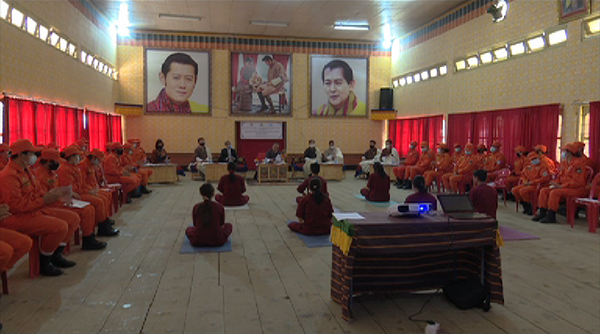 Working as a frontline worker during a global pandemic, like the COVID-19, can be very stressful. If not taken care of, over time, the accumulation of stress can lead to mental health problems such as anxiety and depression. To address this issue, the Health Ministry initiated the “Sorig Zhiney and Luejong” training for the frontline responders of the country.
Working as a frontline worker during a global pandemic, like the COVID-19, can be very stressful. If not taken care of, over time, the accumulation of stress can lead to mental health problems such as anxiety and depression. To address this issue, the Health Ministry initiated the “Sorig Zhiney and Luejong” training for the frontline responders of the country.
Sorig Zhiney/meditation and Luejong/physical exercises are believed to be effective in preventing and combating non-communicable diseases, treating physical ailments and mental illness. It is based on the Bhutanese traditional medicine system, Sowa Rigpa, the ancient science of healing based on Buddhist philosophy and psychology.
Going to work during this COVID-19 pandemic has placed frontline workers under immense and unprecedented pressure, putting their physical, mental and social well-being at risk. Exposure to excessive stress, for prolonged periods, can have many harmful consequences on the emotional and mental well-being of frontline workers.
“Amongst the many challenges, staying inside for months without any outside contact was not just physical but also mentally demanding. I feel if we are mentally strong it is easier to cope with physically. Not being able to socialise with our friends or family for
The practice of Sorig Zhiney and Luejong improves a person’s well-being in all aspects: mental, physical and spiritual. With this training, the frontline workers will be better equipped to cope with stress.
“In the context of COVID-19, we thought this training could be really helpful to our front line workers who have contributed so much to the nation and we also believe that some of our front line workers in the line of duty have been psychologically and physiologically distressed, so we thought this training might be of help especially in promoting their physiological and mental health,” said Dorji Tshering, the Chief Programme Officer with the Department of Traditional Medicine Services under the Health Ministry.
“They try to look into the traditional practice of mental health and also physical health. This is very important particularly at this time to address the issues of COVID19. As we know they work day and night to help all of us. I think they deserve this type of treatment and support from the government to ensure that while helping Bhutanese they are also in good shape; physical, mental as well as spiritual,” said Dr Rui Paulo de Jesus, the WHO Representative in the country.
The DTMS, through funding from the WHO, launched the one-week training yesterday. There are about 170 frontline workers enrolled under the first batch of training.
Yeshi Dorji












